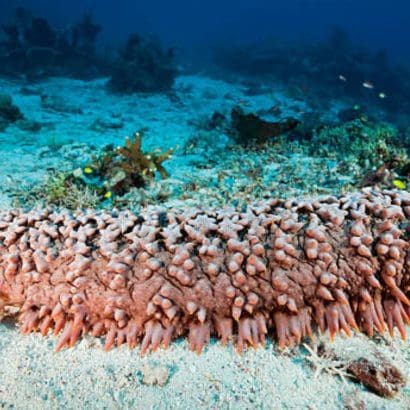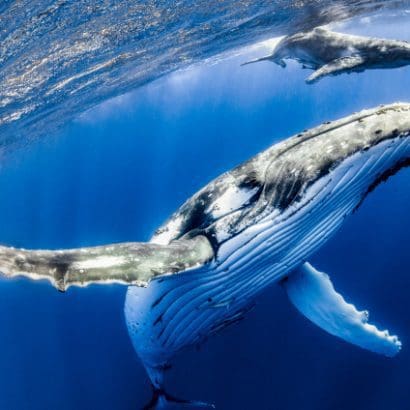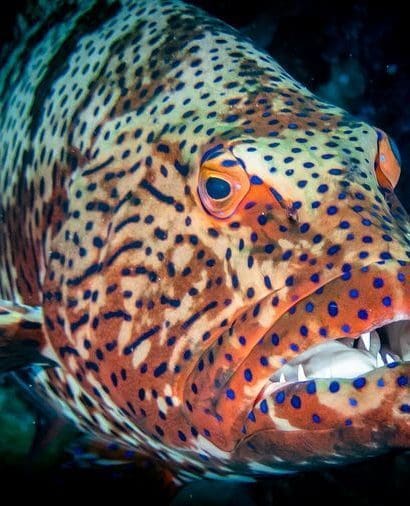
Grouper, a fascinating species of fish, is renowned for its impressive size and plays a significant role in the world of fishing. With its imposing presence and importance in both sport and commercial fishing, the grouper has captured the attention of anglers and industry professionals alike. In this article, we will delve into the characteristics that make the grouper unique, explore its expansive distribution, and shed light on its vital role in the fishing sector. Join us as we unravel the mysteries of the grouper and uncover why this remarkable fish holds such a prominent place in the realm of fishing.
Contents
Grouper Characteristics.
Grouper, a species of fish belonging to the family Serranidae, possesses a set of distinctive characteristics that sets it apart from other fish species. These features contribute to its allure and make it a captivating subject for both anglers and researchers. Here are some general characteristics of the grouper: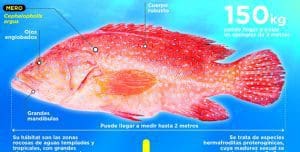
Size:
Grouper is renowned for its impressive size. Depending on the specific species, grouper can range from medium-sized to truly massive. Some species can grow up to several feet in length and weigh hundreds of pounds. This makes them one of the largest fish species in the oceans.
Shape and Body Structure:
Grouper typically has a robust and elongated body with a broad, muscular head. They have a large mouth equipped with strong jaws and sharp teeth, enabling them to capture and consume a variety of prey.
Coloration:
Grouper species exhibit a wide range of colors and patterns. Some have a solid coloration, such as gray, brown, or greenish, while others display intricate patterns and markings. These colorations often serve as camouflage, allowing them to blend in with their surroundings.
Habitat and Distribution:
Grouper can be found in various marine habitats around the world. They are commonly found near coral reefs, rocky areas, and shipwrecks, where they seek shelter and hunt for prey. Different species of grouper have specific habitat preferences, ranging from shallow coastal waters to deeper offshore regions.
Longevity:
Grouper is known for its longevity. Some species have an impressive lifespan, with individuals living for several decades. This longevity allows them to reach their maximum size and contributes to their significance in the ecosystem.
Importance in Commercial Fishing.
The grouper holds immense importance in the realm of commercial fishing, contributing significantly to the industry worldwide. Its popularity stems from various factors, making it a valuable target for commercial fishermen. Here are some key points highlighting the importance of grouper in commercial fishing: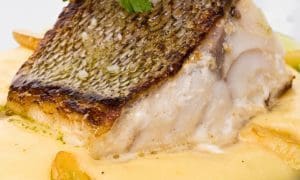
If you want to learn about another highly commercial fish, you can click here.
Economic Value:
Grouper is highly valued in the seafood market due to its unique flavor, firm texture, and culinary versatility. Its desirability among consumers, both locally and internationally, drives demand and contributes to its economic significance. Grouper fetches premium prices, making it a profitable catch for commercial fishermen.
Market Demand:
Grouper is sought after by restaurants, seafood markets, and consumers globally. Its popularity as a delectable seafood delicacy fuels the demand for this species. Commercial fishing operations actively target grouper to meet the market’s needs and fulfill the demand for this prized fish.
Nutritional Benefits:
Grouper is known for its nutritional value, being a rich source of lean protein, vitamins, and minerals. Its low-fat content and high omega-3 fatty acid levels make it a healthy choice for consumers, further enhancing its demand in the commercial fishing sector.
Fishing Techniques:
Commercial fishermen employ various fishing techniques to target grouper. These include longlines, bottom trawling, gillnets, and traps. Each method is tailored to capture grouper effectively and maximize catch quantities.
Industry and Employment:
Grouper fishing supports numerous jobs within the commercial fishing industry, including fishermen, processors, distributors, and exporters. The economic impact of grouper fishing extends to coastal communities that rely on the industry for livelihoods and economic stability.
Conservation and Regulations:
Due to the popularity and commercial importance of grouper, conservation efforts and regulations are in place to ensure sustainable fishing practices. Size limits, catch quotas, and fishing seasons are implemented to protect grouper populations from overfishing and maintain their long-term viability.
Importance in Sport Fishing.
The grouper holds significant importance in the realm of sport fishing, captivating the interest and enthusiasm of anglers worldwide. Its impressive size, strength, and thrilling fight make it a prized catch among recreational fishermen. Here are some key points highlighting the importance of grouper in sport fishing: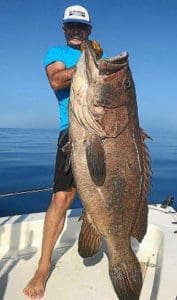
Sporting Challenge:
Grouper presents a formidable challenge for anglers due to its powerful swimming ability and the fight it puts up when hooked. The sheer strength and size of the grouper make it a sought-after target for those seeking an exhilarating fishing experience.
Trophy Fish:
Grouper’s large size and impressive appearance make it a coveted trophy fish among anglers. Catching a sizable grouper is considered a notable accomplishment and a symbol of angling prowess.
Recreational Appeal:
Grouper fishing attracts recreational anglers who seek adventure, excitement, and the thrill of the chase. The anticipation of hooking and landing a grouper adds to the allure of this sport, drawing fishing enthusiasts to target this majestic fish.
Fishing Destinations:
Numerous fishing destinations worldwide are renowned for their grouper populations, attracting anglers from far and wide. These locations offer the opportunity to catch trophy-sized grouper and provide a memorable angling experience.
Conservation and Catch-and-Release:
Many sport fishing communities and organizations promote catch-and-release practices to ensure the sustainability of grouper populations. By releasing caught grouper back into the water, anglers contribute to the conservation efforts aimed at preserving the species for future generations of sport fishermen.
Economic Impact:
Sport fishing, including grouper fishing, contributes to the local economy of fishing communities by attracting tourists and generating revenue from charter services, equipment sales, accommodations, and related industries. The popularity of grouper as a sport fish supports the livelihoods of individuals involved in the recreational fishing sector.
Grouper Conservation.
Conserving the grouper species is of utmost importance to ensure their long-term survival and maintain the ecological balance of marine ecosystems. Grouper populations face various threats, including overfishing, habitat degradation, and climate change. Here are some general points highlighting the importance of grouper conservation:
Ecological Significance:
Grouper plays a crucial role in marine ecosystems as predators, controlling the populations of smaller fish and maintaining the balance of the food chain. Their presence is essential for the overall health and biodiversity of coral reefs and other habitats where they reside.
Vulnerability to Overfishing:
Grouper populations are particularly vulnerable to overfishing due to their slow growth rates, late maturity, and aggregating behaviors during spawning seasons. Overfishing can deplete grouper populations, disrupt their reproductive cycles, and have cascading effects on the entire ecosystem.
Protected Areas and Marine Reserves:
Establishing protected areas and marine reserves where fishing is restricted or prohibited can provide safe havens for grouper populations to recover and thrive. These conservation measures help safeguard their habitats and allow for the replenishment of fish stocks.
Size and Bag Limits:
Implementing size limits and bag limits for grouper fishing helps protect larger, sexually mature individuals that are crucial for successful reproduction. By allowing them to breed and contribute to population growth, these regulations support the sustainability of grouper populations.
Sustainable Fishing Practices:
Encouraging and promoting sustainable fishing practices among commercial and recreational fishermen is essential for grouper conservation. This includes using selective fishing gear, avoiding sensitive habitats, practicing catch-and-release, and adhering to fishing quotas and seasons.
Public Awareness and Education:
Raising awareness about the importance of grouper conservation among the public, fishermen, and policymakers is vital. Education programs, outreach campaigns, and collaborations with local communities can foster a sense of stewardship and promote responsible fishing practices.
Research and Monitoring:
Continued scientific research and monitoring of grouper populations help assess their status, identify critical habitats, and understand their behavior and reproduction patterns. This knowledge is crucial for effective conservation management and decision-making.
Potential Call to Action to Promote Sustainability and Conservation of Grouper.
In conclusion, promoting sustainability and conservation of grouper requires collective action and a shared commitment to preserving this magnificent fish species. To safeguard the future of grouper populations and their ecosystems, we must take the following steps:
Firstly, it is crucial to raise awareness among individuals, communities, and decision-makers about the importance of grouper conservation. By educating ourselves and others about the ecological significance of grouper and the threats they face, we can foster a sense of responsibility and inspire action.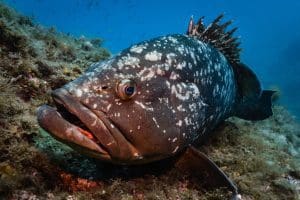
Secondly, supporting and advocating for the establishment of protected areas and marine reserves is essential. These designated zones provide sanctuaries where grouper populations can recover, breed, and contribute to the overall health of marine ecosystems.
Thirdly, promoting sustainable fishing practices is paramount. Commercial and recreational fishermen should adopt selective fishing gear, respect size and bag limits, and adhere to fishing quotas and seasons. Embracing catch-and-release practices can also help ensure the survival of mature grouper individuals and maintain viable populations.

